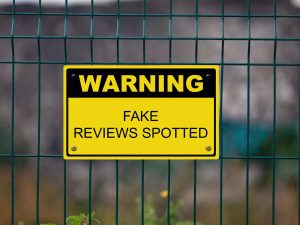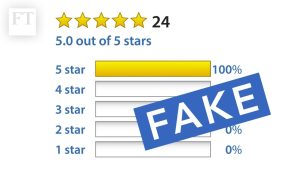Fake Reviews: How Small Business Owners can Spot Them
The problem of fake online reviews has become increasingly prevalent and has garnered attention from both consumers and the press. The Federal Trade Commission (FTC) has taken action against companies engaging in fraudulent review practices, such as levying a $4.2 million fine against a fashion retailer for suppressing negative reviews. The FTC has also issued guidelines for publishers and retailers, as well as guidance for consumers on identifying and reporting suspicious reviews on various platforms.
Curtis Boyd, founder of The Transparency Co, has developed technology to detect fake reviews at scale and has been contracted by government agencies to ferret out fake reviews online. Boyd believes that fake reviews are online reviews created with the intention of deceiving others and artificially inflating ratings. He suggests that the best way to subdivide fake reviews is by understanding whether the reviewer profile is real or not.
Boyd believes that app reviews are likely the worst affected by fake reviews, with Google disclosing that they do not verify app reviews or browser plugin reviews. The incidence of fake reviews is about the same for local reviews and online product reviews. Boyd notes that all industries within local search are susceptible to fake reviews, but consumers stand to lose more from fake reviews in specific industries such as doctors, lawyers, and home service providers.
Boyd believes that the fake reviews problem is getting worse each year, with Google disclosing that they removed 55 million fake reviews in 2019, 75 million in 2020, and 95 million in 2021. He notes that review fraud in Local Services Ads on Google is also skyrocketing.
Boyd identifies several telltale signs of a fake local review, including duplicate content, anonymous profiles, a lack of category diversity, major geographical distances between businesses being reviewed, and exclamation points and over-the-top sentiment. He also notes that reviews written by review pods, keyword stuffing, and authorship clusters are less noticeable signs that can be difficult for non-experts to spot.
Boyd does not believe that it is generally effective to report fake reviews to publishers, as there is very little accountability from big tech, and most fake reviews are positive and serve business interests. He suggests that working with the offices of state attorney generals, adopting fake review detection technology among major reputation management players, and educating consumers on performing better due diligence are realistic paths to meaningful reduction of fake reviews in the local search space.
Boyd believes that enforcement is crucial in reducing fake reviews. He suggests working with the offices of state attorney generals, as they have enough bandwidth to go after companies large and small. The Transparency Co has contracted with six different AG offices in 2023 alone to pursue bad actors.
 Adoption of fake review detection technology among major reputation management players could also help reduce fake reviews. By alerting customers that they have fake reviews and need to take action or alerting customers that their competitors have fake reviews and can take action to remove them, more attention can be brought to the rampant problem of fake reviews.
Adoption of fake review detection technology among major reputation management players could also help reduce fake reviews. By alerting customers that they have fake reviews and need to take action or alerting customers that their competitors have fake reviews and can take action to remove them, more attention can be brought to the rampant problem of fake reviews.
Educating consumers on how to perform better due diligence is also essential. Consumers need quick and easy access to consumer-focused websites that show which companies have real reviews. They may not have the time or resources to check themselves and cannot afford to make a mistake by hiring a company that has represented itself fraudulently.
In summary, the fake reviews problem is a growing concern, affecting various industries and areas of online reviews. However, there are realistic paths to meaningful reduction of fake reviews in the local search space, such as enforcement, adoption of detection technology, and educating consumers.




